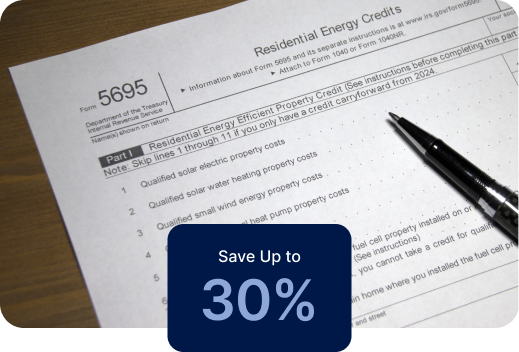The renewable energy sector continues to expand, despite policy uncertainty under the Trump administration.
Vermont Solar Incentives: 2025 Overview
Vermont offers excellent incentives to make solar energy affordable. Homeowners can benefit from the 30% Residential Clean Energy Credit, and the state provides additional exemptions like the Renewable Energy Systems Sales Tax Exemption. Net metering allows residents to earn credits for excess energy, reducing future bills. Going solar in Vermont is a smart way to…

Residential Clean Energy Credit
The Clean Electricity Investment Credit (previously called the Federal Investment Tax Credit) helps lower the cost of installing solar panels by 30%. This credit covers everything: the solar panels, equipment, labor, permits, and even sales tax.
For example, as of 2025 the average cost of a 10 kW solar system in the U.S. typically ranges between $21,000 and $29,500 before applying any federal tax incentives. After claiming the 30% Clean Electricity Investment Credit, the price drops to around $14,980 to $21,070, depending on the state and other factors like equipment quality and labor costs.
To claim this credit, you must buy your solar system with cash or a loan (leases don’t qualify). You also need to owe enough in taxes to claim the credit, but if you don’t, you can carry it over to future years until 2034.

Claiming the Clean Electricity Investment Credit is simple!
Step 1
Print IRS Form 3468
Step 2
Fill out the form using info from your installer
Step 3
Submit it when you file your taxes
What are the top solar incentives in Vermont?
Besides the Clean Electricity Investment Credit (former ITC), homeowners can take advantage of several outstanding incentives that significantly enhance the return on investment for solar panels. Here are some of the most effective ways to lower your solar installation costs.
Incentive
Savings
Summary
Disclaimer: The information provided here regarding solar incentives, tax credits, and rebates is for general informational purposes only and may vary based on your specific circumstances. For exact details, eligibility requirements, and current rates, we recommend consulting a certified solar installer or a tax professional. Incentives can differ by location, utility provider, and individual project, so it’s important to get personalized advice for your solar installation. Always verify the most up-to-date information from your local solar installer to understand how these incentives apply to your project.
Knowledge Base
Find everything you need to know about solar in your state and nationwide

Get a Quote
Discover the Ideal Solar System for Your Home in Just a Few Clicks!







